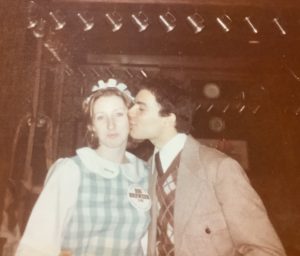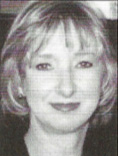It’s Christmas Eve and the Brew and Burger on 47th Street where I work is crowded with last-minute shoppers and tired children brought in from the boroughs and New Jersey to see the tree at Rockefeller Center by irritated parents and young nannies with short skirts who look at their watches anxiously. I’m 21 years old, just out from Ireland a couple of months and homesick. For the first time I wonder what I am doing in this strange city with its frenzied pace. I miss the countryside and the farmhouse that is home, and the younger brothers and sisters who would have gone to bed early in anticipation of Santy. The older ones stay up for midnight Mass. I remember how the gravel would crunch under our feet from the frost as we made our way to the car. How my mother would always make us look up at the stars, brilliant in a sky that can only get that dark in the country. You could picture the three wise men making their way to Bethlehem for the birth of Jesus.

I finish my shift and hand over my book to Nick, the Italian waiter, who gives me a hug and a kiss on the cheek. It took me years to get used to the fact that Americans are always kissing and hugging — to this day I never know which cheek to present — but it’s nice too. You didn’t do those things in Ireland. Nick says he’s Italian and this I find strange too since he has never been to Italy. It’s one of the things about America that confuses me.
It doesn’t feel like Christmas Eve, even with the lights in Saks’ windows and the skaters twirling in the shadow of the giant pine at Rockefeller Center, which we, my friend Cathy and I, pass on our way to the 49th Street subway station to get the D train to the Bronx. Cathy, who says she’s Irish (my roommate Nora says, with affection that, Cathy’s only a narrowback), wants to stop off on the way home to visit the Lynch family — they are narrowbacks too. Because I have nothing else to do and I’m lonely, I go along. The Lynch house, one of the last remaining two-story frames in the Bronx, is nestled in among the apartment buildings. The kitchen is big and cheery and Mrs. Lynch is too. Children, lots of them, come and go and adults too, each one with a warm hello. I don’t remember all the details, these many years later, but I do know that as I sat down to dinner with this wonderful family, who, though thousands of miles and many generations removed from rural Ireland, reminded me so much of my own, I knew for the first time that you didn’t have to be born on the island of Ireland to be Irish.
You could be Irish and never have set foot in Ireland. Over the many years since then as I’ve traveled around this country, I’ve found Irish people and places, and monuments in every comer that make me feel at home. I’ve come to learn that certain traits and characteristics survive down through the generations, so that you could be born in a desert and still be Irish. I’ve discovered, too, that Ireland will always have a special place in the hearts of Americans of Irish ancestry. This sometimes poignant attachment never fails to astonish me. It’s the reason why someone like Cathleen Black, the president of Hearst Magazines, takes time out from a busy schedule to talk to Irish America. It’s the motivation for Bill Flynn, chairman of Mutual of America, to put his reputation on the line by visiting Gerry Adams in Belfast six years ago and inviting him to speak in America, thereby clearing the way for the peace process.
I am proud to call America home now. This year I will enjoy Christmas in California with my more than twenty nieces and nephews, who are American yet still Irish. (And, yes, Cathy, you are Irish too). And when I think of Ireland I will picture the children, and with a grateful heart be thankful for the role that the Irish in America played in ensuring that theirs is a peaceful Christmas.


Thank you so much for this beautiful and touching essay. It so reminded me of my Kelly family who came over in the 1940’s. William and Margaret Kelly settled on East Third St. in South Boston, Ma. It’s hard to imagine what they went through. They had twelve plus kids – one of them being my dad, Joseph . He raised us with ;my mom, Alice, in South Boston. We had a wonderful life.
Thank you again,
Karen
Lovely! Growing up in an Irish enclave in Boston as an immigrant from an Irish enclave in Newfoundland, I can look back now on the traditions in both places that had been imported and nurtured intact by the immigrants. I’m happy I experienced them and I’m happy the old folks kept them. The first time I set foot in an Irish town, (Ennius) I laughed out loud. The woman I met on the plane who was with me asked what I was laughing at. I said, “It looks just like home.” She asked which one, Charlestown or Newfoundland. I said, “Both.” All Irish names on shops and pubs, people who could have been beamed by Scotty from either place.. I felt as if I had been there all my life.
When I first came to New York in 1972 I figured out that people that asked “where are you from “or when were you back “were like my self recent arrivals.Narrow Backs would say “My family is from county?”.